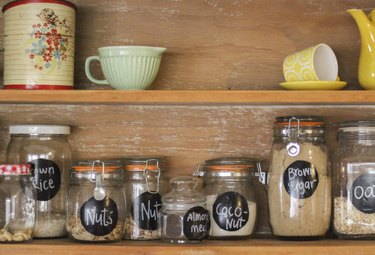
Storing raw nuts isn't as simple as storing commercially roasted and packaged nuts. Roasting nuts decreases their susceptibility to turning rancid. Both raw almonds and cashews require careful storage if you want to save them for more than a few days. Because both contain a large amount of unsaturated fat, they have a higher chance of turning rancid than nuts with a lower fat content.
Storing Raw Almonds
Video of the Day
Almonds grown in California labeled as raw may not actually be raw, since the United States Department of Agriculture will no longer allow the sale of raw almonds. Instead, raw almonds undergo pasteurization, a heat or chemical treatment. Almonds grown in other countries and sold in the United States might be truly raw. All almonds labeled as raw need to be stored in a cool, dark, dry area. You can freeze raw almonds or refrigerate them. Seal them in an air-tight bag or moisture can enter the bag and cause mold growth. Truly raw almonds will sprout; once they sprout, they last just a few days before going rancid.
Video of the Day
Storing Raw Cashews
Cashews, like almonds, usually aren't truly raw even if they're marked as such. The shell around the cashew nut contains urushiol, the same substance found in poison ivy. The inside of the shell contains toxic resins, which can contaminate the nut if not carefully removed, so processors remove the outer shell with heat treatment or by boiling in oil. Very few manufacturers remove the shell without using heat, according to the Living and Raw Foods website. You can store raw cashews for up to a year or more if you keep them in a sealed bag in a cool, dark, dry environment such as the freezer. You can keep them in the refrigerator for four to five months.
Recognizing Rancid Nuts
Nuts high in unsaturated oils, the more healthy type of fat, go rancid more quickly than nuts high in saturated fats. Smell isn't always a reliable way to determine if nuts have gone bad; a rancid nut tastes sour and rank. Rancid nuts may also appear discolored.
Risks
The shell of truly raw cashews contains toxins that can cause an allergic reaction similar to poison ivy. Some ingredients in the shell are used in paint thinners. Removing the shells by yourself is difficult, which is why most people buy and store cashews with the shell already removed. Raw nuts can also harbor bacteria that can make you sick, such as salmonella.